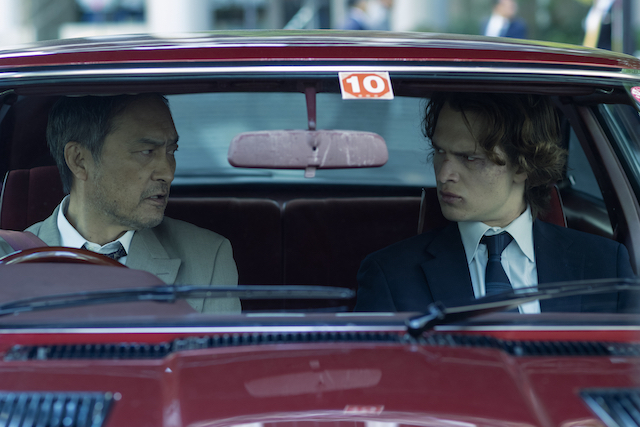
©Tokyo Vice, Ansel Elgort, Ken Watanabe
Tokyo Vice : In 1999, American journalist Jake Adelstein has relocated to Tokyo and must pass a written exam in Japanese to have the chance to join the staff of a major Japanese newspaper. He succeeds in becoming their first foreign-born journalist and starts at the very bottom. Taken under the wing of a veteran detective in the vice squad, he starts to explore the dark and dangerous world of the Japanese yakuza.
Creator: J.T. Rogers
Starring: Ansel Elgort, Ella Rumpf, Hideaki Ito, Ken Watanabe, Rachel Keller
TV Network: Max
Genre: Crime
Executive producers: J.T. Rogers, Ansel Elgort, Alan Poul, John Lesher, Emily Gerson Saines, Destin Daniel Cretton, Ken Watanabe, Michael Mann, Jake Adelstein, Kayo Washio, Brad Caleb Kane
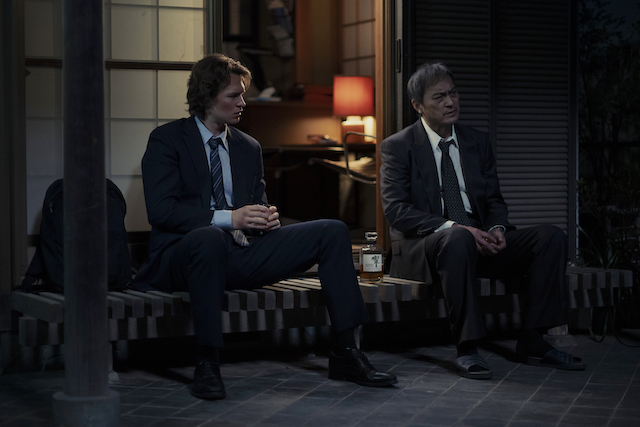
©Tokyo Vice, Ansel Elgort, Ken Watanabe
Press Conference with Actors Ken Watanabe, Ansel Elgort, and Rachel Keller
Q : When did you guys all realize; “Oh wait, this is gonna be something special and people are really gonna like it”?
Ansel Elgort: I mean, for me, in 2015, I went to Tokyo for the first time and was blown away by the visuals of the city and also the culture. I thought: ‘Wow, I want to do something here one day. It would already be great in a certain way.’ As far as shooting goes, you can’t mess up the visuals of this place.
I was actually attached to a different project that was shot in Japan. It was a very western kind of film. It wasn’t really about Japanese culture, and didn’t really give you behind-the-scenes into Japan the way that this show does. Pickpockets in any other culture are not the same. And I thought: “If this could be a series, it could be great, but we have to get a really great director.”
As soon as Michael Mann was involved, I had to watch Heat and The Insider. He has a plethora of great films to choose from. I asked Jamie Foxx and Spielberg about Michael Mann, who I was working with at the time, and they said: ‘He will work harder than any director you’ve ever worked with.’
When we started preparing with Michael, he suggested that we take Japanese for 8 hours a day. Fortunately, Alan (Poul) said ‘maybe 4 hours a day’. Michael organized a journalism crash course that involved real stories in Los Angeles, writing, and having real interviews with police reporters.
It was the hardest I’d ever worked, and that was just in preparation. So I knew this was going to be something special. Just this guy(Jake Adelstein) is so dedicated to his work. And then Ken Watanabe being involved was like a dream come true. I had faith in this show from the beginning and it’s great that it turned out. It’s something that we’re all really proud of, and I think that Season 2 will only get better.
Q : The show does an excellent job of transporting you back to the late 1990s in Tokyo. Can you all talk about what it’s like behind the scenes to achieve the gritty, authentic feel of being transported back in time?
Ken Watanabe: In Tokyo Vice, everything is back to the 1990s: cars, props, haircuts, and clothes. The preparation they have put in is truly amazing. As an example, my car is a Fairlady Z (launched in 1969, it was the first generation of Z cars and is also known as Datsun 240Z or ‘Z-car’). They did such great research on so many things and different clues, finding not just a good car and all the necessary parts, but basically everything.
Q : Has the crew of this new season undergone significant changes compared to the previous one?
Rachel Keller: A significant number of our crew remains from the first season to the second season. I was so glad that the women who dressed me and helped with the everyday things, such as hair and makeup, were as talented, dedicated, cool, and just wonderful.
I was so glad that the women who dressed me and helped with the everyday stuff, hair and makeup, were as talented and dedicated and cool and just wonderful. My dresser, Hakamada-san, was also the first dresser in the first season. And we had an awesome friendship that makes you feel safe and collaborative, like on the ground. Of course we’re having bigger conversations with the designers, but then you get that woman who’s right there with you in your face and body. Having those relationships, many of which were from the first season into the second season, was such a joy.
Q : Do you have a particular scene from Season 2 that you enjoyed more than others?
Ansel Elgort: A unique sequence in Tokyo Vice occurs in which some characters are left in a lot of snow, unlike anything else you’ve seen. Tokyo doesn’t have too much snow, that’s for sure. So it’s probably not in Tokyo, but I don’t want to ruin anything.
Ken Watanabe : And mad character Hayama appeared…
Ansel Elgort: I also really like episode 9. The reason is, and this may sound political or whatever, but I have great scenes with Sho, Ken Watanabe, and Rachel Keller.
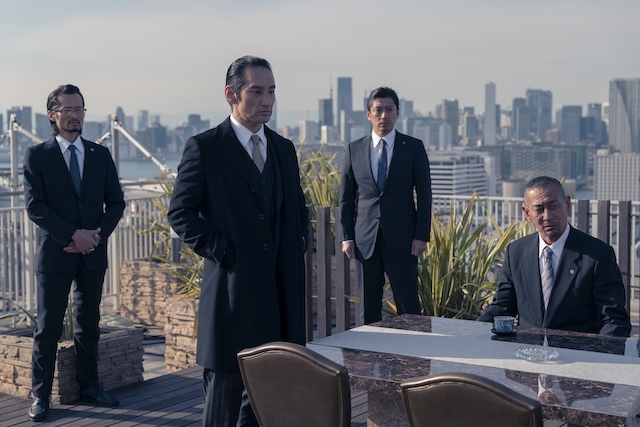
©Tokyo Vice, Ayumi Tanida
Q : What are the primary distinctions between filming a show in Japan and in the U.S.?
Ansel Elgort: It’s surprising that Japan has more normal working hours than America. Of course, in Japan, there is an amazing work ethic, but there is also a culture of taking a nice break and enjoying our lives at the end of the day.
Ken Watanabe – To be honest, I don’t see a significant difference, at least for an actor. Acting is acting, especially when you have a good script and just follow the director. It’s possible to observe a slightly different approach when shooting with a little bit of hard work, but that’s it.
Q : When you returned for season 2, you were warmly greeted by everyone in Tokyo. I’m curious if you have any anecdotes to share.
Ansel Elgort -The reception has been fantastic. It’s not like a big show, and it’s not really a big event in the rest of the world yet. But the people who have seen it, they really like it. And the reason is that they think it’s authentic, which is something that we’re so glad to hear because we really focused on authenticity. In addition, we had a significant budget.We were able to achieve really high production quality. And as a result, I think people were pleased that not only were we authentic, but also it felt like we were watching a movie.
Q : Did Season 2 have a script you couldn’t wait to shoot?
Rachel Keller: I was so excited to get into my new club. I really loved the wood and green design that they put into the club. It felt so much like what Samantha would have wanted. It becomes her domain, her kingdom, a place of safety for her and the women she’s working with. Yeah, that was quite fun. It was really nice to get into that space. The leather jacket and motorcycle vibe are both nice and comfortable and cool when Sam on the set.
Some of these dresses are handmade and hand-painted. One dress is silver with bamboo. I was so moved by the craftsmanship at that. I shared some photos of some designs with the hair team because often at the club, we do these really gorgeous long shots where they’re definitely going to be behind me for a lot of it.
I just got really into some of the ’90s runway shows where they kind of architecturally designed the back, like these haircuts. So the hair and makeup team went to Kyoto and got these Jade combs to use. They brought back the most stunning combs in the back of my hair, and I was so moved that I cried. It was really just a moving movement of collaboration.
Ansel Elgort: Since I play a newspaper reporter, I wanted to work on my writing skills more. So I spent a lot of time working on being able to write really fast. I have prepared for a few interview scenes since the beginning, with an amazing Sensei. And we worked on writing and we would do the scenes almost like with a timer. It was like he would read the lines and I would have to write really quickly.
He would go faster and faster and faster, because people might say it’s really fast. And being able to do the scene, say my lines, and write down everything that they were saying quickly, I was really proud of myself. It took me about three scenes to complete that. It took a lot of practice to make it more authentic, but it was rewarding. Because it’s the 1990s, we’re not taking notes on our phones or even recording. I thought writing and taking notes on a notepad in the language would be really cool.
Ken Watanabe: When I read the script of the first episode, I was so surprised: it was not the same Katagiri as the first season. It was amazing to create a character that has undergone significant changes. I was impressed by that turning point.
Q : When Tokyo Vice Season 2 comes to an end, what are your expectations of what audiences will say?
Ansel Elgort: At the end of season people were saying they didn’t get episodes 9 and 10. Which was a little bit disappointing I think. But the audience will not be disappointed at the end of season 2. You will be satisfied. You’ll feel like the movie ended, the show ended at a great place. Of course you would keep going, I’m sure we could go on. But it’s not like you need to in order to wrap up the story. People will be feeling the show was great and they’ll be completely satisfied. At least that’s how I feel.
Rachel Keller: It’s very freeing. I mean the second season coming back to be able to actually communicate, even in a not perfect way, it was very freeing.
Ansel Elgort: Yeah, now I’m at the point where I definitely can speak and I can communicate, now I’m at the point where maybe people think I’m better than I am. And sometimes I speak, especially with Oji-san, which means like an uncle, an older guy, and they don’t speak to me. Sometimes I’m still so lost. Ken Watanabe says this is like one of the hardest languages in the world. At this point I’ve been studying this language pretty hard for about four years, but it is still a long way to go.
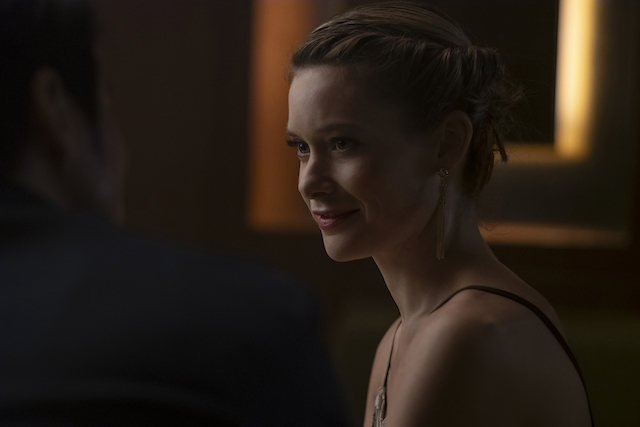
©Tokyo Vice, Rachel Keller
Q : Can you talk a little bit about how the show has changed in the editing room in ways you didn’t expect?
Ansel Elgort: There was one scene that we prepped for so long. A scene at the beginning of episode 3 where Jake is getting interviewed on television. I learned so much vocabulary from doing this, it was just dense, really like fluent Japanese about education and regional issues, very intelligent and real, Jake talking about the motorcycle gang on a television broadcast. That was like multiple paragraphs, but then you watch the episode and I get about two sentences. Then my character turns off the TV for some reason, and we never get to see all that.
Q : During the first season, Jake is very hungry to prove himself and he’s willing to do basically anything to get a scoop. Has he changed at all in season 2? Has he learned any sort of discipline? What is his state of mind regarding the newspaper job?
Ansel Elgort: At the end of season he’s angry, he’s upset with himself. He sees this tape of Paulina being killed and he goes to Katagiri and he asks for forgiveness and also says: “However you want to do this, we’re gonna do it your way”. It’s the first time Jake is humbled. But then we have episode 1 of season 2 and things don’t go their way. Jake is still really upset and he still really wants to chase things but Katagiri says the only thing they can do now is wait.
And when you pick up episode 2 you realize that Jake has been waiting, for the first time he’s doing things by the book. He’s at the newspaper office listening to his bosses, like Katagiri says and he’s not going after the Yakuza. He has a choice between the motorcycle gang and the Yakuza and he goes after the gang instead. He is learning patience, respecting his role. Those are qualities that are totally different from the Jake that we see in season 1. And it’s through learning those qualities that they’re able to be successful in season 2 in what they’re trying to do.
Ken Watanabe: Both Jake and Katagiri learn really dangerous things about the investigation of the Yakuza. That’s why they need to be patient and wait for the next opportunity to investigate. And then we try to get together and go for it. This is the core of Season 2.
Q : There is a new detective who has joined the force, your superior, Nagata(Played by Miki Maya) How does your character balance what’s going on with his family, the threats that have been against him, with trying to do his job and maintain not being corrupted by the Yakuza?
Ken Watanabe: This new character, Detective Nagata, is a very smart and skilled woman. She wants to provoke the fall of the Yakuza society, smash it. She has some kind of background of really personal sadness, after refusing her invitation to join her in her task Kakagiri decides to embrace her project.
It’s a brand-new working team, a great relationship to explore, it was built with great depth and purpose. It is unusual to see a female detective in a super male profession, especially in the Japanese police force in the late ‘90s. We decided to develop a come-out-swinging female character that can be a peer to both Ken Watanabe and his character Katagiri, something that truly opens up the show in an unexpected way.
Q : Samantha has the club, but she has the Yakuza as a partner. She’s trying to do things in a new way to treat the women that work for her with a lot of respect in a safe environment. Can you talk about that balance that comes with having the Yakuza as a partner and what she’s going through?
Rachel Keller: She’s saved up all this money to own the club herself, but then that money was stolen from her and she kind of barrels through to open the club. It’s very important to her and for her own protection, but for these women as well. Sam sort of has like a fire lit under her the entire season, because she has these external pressures. Her back’s against the wall. There’s really no other option.
They push her into these very difficult situations of having to make choices just for herself and for the women around her. Which is very dramatic and interesting. It’s nice to play those things, because I guess it’s not quite how she had planned it to be, but it pushes her into difficult situations and has to make some hard choices.
In the end she gets things done the way that she does. It’s difficult sometimes to think about that American ambition like: “I’m gonna get it done my way, because I’m American and I know how to do that” inside of a Japanese culture where there’s different boundaries. She respects that and understands it, but she’s gonna barrel forward and get it done her way. So that’s a very appealing narrative arc to develop.
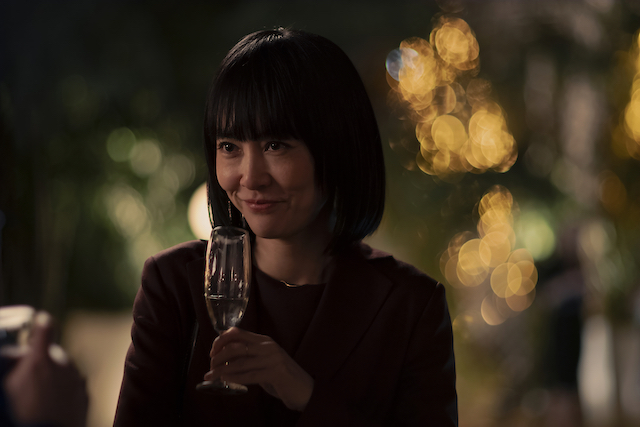
©Tokyo Vice, Rinko Kikuchi
Q : From the new episodes, it can be discerned that she is a person of honor who aims to treat others with honor in a dangerous location.
Rachel Keller: Yeah, I think so. It’s such a layered thing to be a foreigner woman trying to start a business, signing the deal with the devil. Having the Yakuza be the part owner of the club is a really sticky situation. She is coming from being caged into a belief system that doesn’t allow any space for her own expression or her own individuality or autonomy.
So the club is meant to do that, but it is sort of a bit of a smoke and mirrors, because it really isn’t hers. She does come to learn that freedom, or independence, doesn’t necessarily mean owning something. But sometimes you need that tangible thing in order to hold onto something so that you can say to yourself: “I’ve accomplished something and I do have that independence now”.
Q : For each of you, I want to shine the light on an unsung hero who did something that really helped make this show what it is. Who is someone you want to thank?
Rachel Keller: Eriko Yamaguchi. She was our dialect coach on Tokyo Vice and she’s like my best friend now. I’m just convinced the show could not have happened without her. She was not only doing the coaching for us in the Japanese but also helping the Japanese actors with their American, with their English. She was also translating for cinematographers in production meetings. She was always there. I’m just really convinced it couldn’t have happened without her.
Ansel Elgort: I would say Ohta-san who is our production designer, because when you go into the Meicho Shinbun office – I’m so sad they took that away – they should have just kept that as like a tourist place, because you really are transported. It’s 360 degrees, completely immersed in a ‘90s newspaper office. All the details. Every desk, there’s details, there’s books, there’s everything.
Ken Watanabe: I heard about this project 8 years ago in London, I was playing the King and I, a Broadway show. And then J.T. Rogers came to London because his friend Bartlett Sher was directing King and I. Then he told me about this project, a detective story in the Yakuza world. But it’s completely a different perspective because the main character is a journalist who wants to see the underground society of Tokyo. I immediately felt it was an amazing take. I followed all the stages of developing this series, the way J.T. Rogers pulled off this show is admirable.
Q : Something very fascinating about the show is that conversations start in Japanese, go to English, and go to Japanese. Is that all on the page?
Ansel Elgort – In season 1 I was acting like Jake who just did what he thought. I would usually learn the scenes in both Japanese and English and then do some takes in Japanese and some takes in English. But then this season I would usually speak to Ken Watanabe and to J.T. Rogers before, and Ken Watanabe would have the final say as to whether he thought you shouldn’t do this in Japanese because we need your emotion and you’re better emotionally in English.
But sometimes Jake (Adelstein) is using Japanese as a tactic, so I would audition the lines with Ken Watanabe first this season and then he would give me the go-ahead or not. But we still shot some scenes both ways. And it was nice, because if you did a scene five times where you said the line in Japanese and then J.T. Rogers would say: “Okay, come on Ansel Elgort, just do it once in English ”. And then I would just say it once in English and then it would come out so organic that it would help the performance.
Ken Watanabe: We needed to take a balance about the back and forth to the language. Having subtitles all the time could have been a very difficult moment for the audiences. So sometimes we just took some parts back in English, others in Japanese. Yeah, we had a lot of conversations about how to use the different languages.
Q : In Japan whisky is a big thing. There’s a scene of Ken Watanabe and Ansel Elgort drinking Japanese whisky. How much did you debate what whisky to include and was it always going to be Hibiki?
Ken Watanabe: Yeah, 1990 was not the most familiar whisky in the world, in the – Hibiki, not yet. But Alan and the prop guy chose how great whisky to show in the show, in the world or something. And then shape and then familiar whisky right now and they choose it.
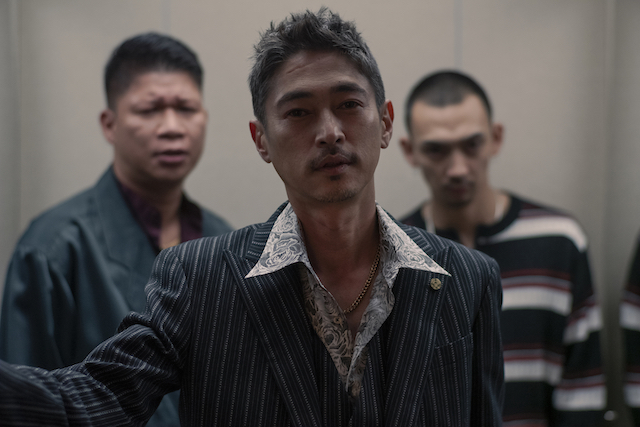
©Tokyo Vice, Yosuke Kubozuka
Check out more of Adriano’s articles.
Here’s the trailer of the series.

